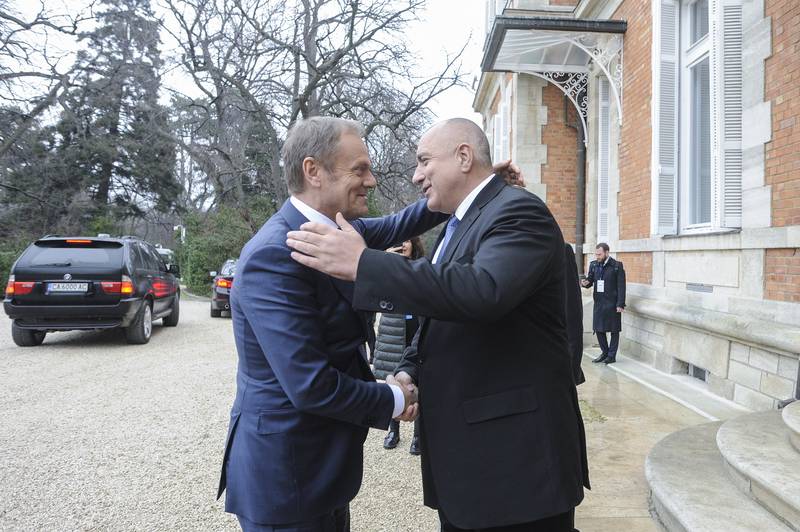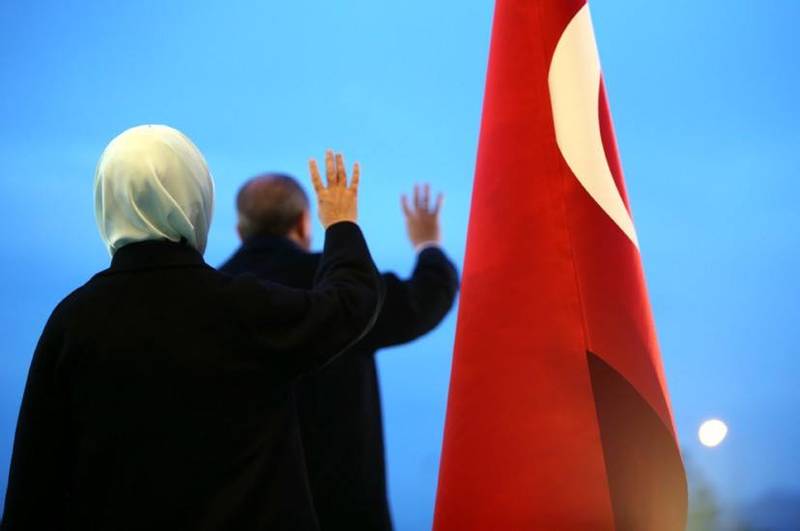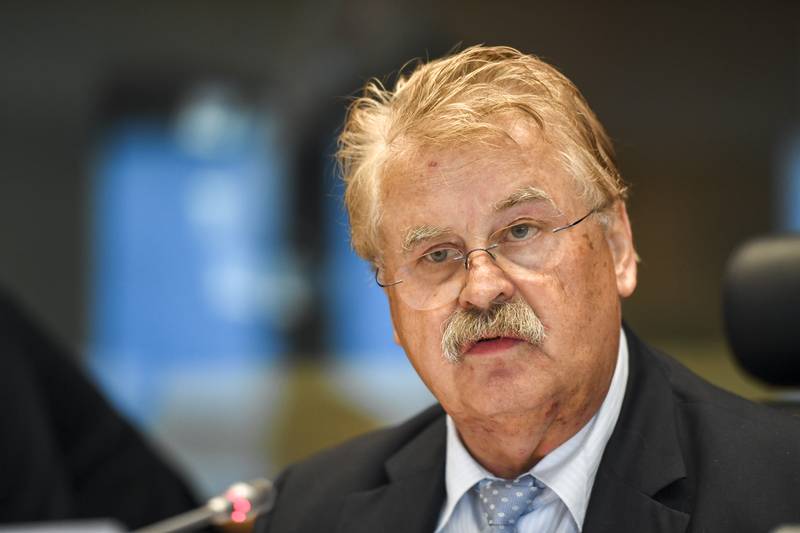The Difficult Turkey
Adelina Marini, October 18, 2012
 "No one is trying to put Turkey's negotiating process with the EU in the Guinness Book of Records, but efforts are needed by both sides", EU Enlargement Commissioner Stefan Fule said responding to a question by a Turkish journalist on October 10th, after officially presenting the progress reports of the countries from the enlargement package. Both the question and the answer clearly demonstrate the complexity of the negotiation process between the two parties. As the tradition commands, the report (as usually very detailed and long) contains the same message as in previous years, and the Turkey's reaction was also expected - the report is not balanced.
"No one is trying to put Turkey's negotiating process with the EU in the Guinness Book of Records, but efforts are needed by both sides", EU Enlargement Commissioner Stefan Fule said responding to a question by a Turkish journalist on October 10th, after officially presenting the progress reports of the countries from the enlargement package. Both the question and the answer clearly demonstrate the complexity of the negotiation process between the two parties. As the tradition commands, the report (as usually very detailed and long) contains the same message as in previous years, and the Turkey's reaction was also expected - the report is not balanced.
When presenting it, Stefan Fule said that Turkey was a key country for the EU because of its dynamic economy, its strategic position and its important regional role, which is a relatively new formulation, aimed at taking into account the country's growing influence globally and given the developments in the EU's and Turkey's neighbourhood. "It is in our interest and Turkey's interest that accession negotiations regain their momentum. We believe it is important that work resumes on negotiating chapters, interrupted in recent years because of a lack of consensus amongst Member States", Stefan Fule said, emphasising on the active support for the positive agenda, which the Commission launched in the beginning of the year, that remains essential for the European perspective of the country.
It is a fact that Turkey welcomes the agenda which is part of the efforts of the indeed creative EU Enlargement Commissioner (a Czech) Stefan Fule to bring new momentum in the process of enlargement, especially in terms of the difficult countries - Macedonia, Bosnia and Herzegovina and Turkey. Given that Bosnia is a specific case, those are the countries that have severe and looking-as-if-unsolvable issues with their neighbours. Macedonia for years has been in a dispute with Greece over its name, which prevents the country from starting accession negotiations. The Commission is maintaining the reform impetus of the country with the novelty High Level Accession Dialogue for which officials in Brussels often say it does not replace the accession negotiations. Its purpose really is just to keep the attention of the authorities on reforms and oriented toward EU's requirements.
Similar is the situation with Turkey which, however, is working on a different agenda, called "positive". Until very recently it even lacked a filling but gradually it started filling with specific topics, one of which is energy cooperation. But that's it with the positive.
The findings of the report are as positive so not very motivating, especially in terms of the essential for the EU problems - the relations with Cyprus and therefore the application of the agreements with the EU about the customs union and the respect for the European legislation, embodied in the rotation presidency. In the current semester of the year (from July 1st to December 31st), at the helm of the Council of the EU is  namely Cyprus. Turkey did not respect the numerous calls not to freeze its relations with the Presidency because it is a major body of the EU, enshrined in the treaties. The report says that in the second half of 2012 Turkey continued to boycott the meetings, chaired by Cyprus. This is why the assessment of the report on this point is that progress lacks for normalisation of relations with the Republic of Cyprus.
namely Cyprus. Turkey did not respect the numerous calls not to freeze its relations with the Presidency because it is a major body of the EU, enshrined in the treaties. The report says that in the second half of 2012 Turkey continued to boycott the meetings, chaired by Cyprus. This is why the assessment of the report on this point is that progress lacks for normalisation of relations with the Republic of Cyprus.
Turkey for its part blamed the Commission that it did not mention the responsibility of the Cypriot Greeks for the negative result. "We expect the EU to contribute to a solution rather than being a party to the Cyprus problem imported into its midst as a result of its own mistake. This can only be possible if it revises its discriminatory and biased attitude", says a special statement of the Turkish Foreign Ministry on the occasion of the report.
On the remaining topics of monitoring Turkey's progress, which is officially a candidate country since 2005 but in the last 2 years there is no single chapter opened because of the blockade of Cyprus and several other EU countries, Turkey reveals problems very similar to those of the Western Balkan countries, although the scale and scope are different. One of the major and very serious problems is the restriction of the freedom of media and the number of cases against writers and journalists. As a result, there is a broadly based self-censorship in the country, the Commission claims.
In this regard is another important part of the process of Europeanisation - democracy and rule of law - where the Commission reports positive steps related to the work on the new constitution of the country. This is an issue subject of constant criticism in previous reports of the Commission mainly because the proposed amendments in constitution of the country are not subjected to broad public debate with the broadest possible circle of participants. In spite of the positive steps, however, the report finds out a repeated lack of consultations in the legislative process. Besides, the Kurdish issue remains a major challenge for the Turkish democracy and an increase of the terrorist attacks by PKK is also reported.
There is some progress in terms of the reform of the judiciary after the third reforms package in the judiciary was adopted that introduces a number of improvements. Among them is easing the restrictions on the media to report on criminal investigations as well as abolishing the provisions allowing the prosecution to ban publications. Nonetheless, the reforms do not manage to deal with the main shortcomings because of which Turkey still is a subject of condemnations by the European Court of Human Rights. Those are the length of pre-trail detentions and the large backlog of pending serious criminal cases.
Fight against corruption is also not a reason for positive findings in the Commission report where "limited progress" is noted, and by the way this is the most frequent assessment in the document. Although "some" movements are noted in terms of indictments and the transparency of financing of political parties, this is still insufficient, the Commission notes. A deficiency is the broad scope of immunity. There is no track record of investigations, indictments or convictions related to corruption. The implementation of the national anti-corruption strategy requires a greater political commitment. Uneven progress is reported in the fight against organised crime as well. There is no law for personal data protection, which prevents police cooperation at international level and the conclusion of an adequate partnership agreement with Europol.
 Turkey's economy is the only source of good news in the report and also of the growing self-confidence of the country not only toward the EU but globally as well. Turkey more and more often calls in talks to be referred to as a member of the G20. The Commission report notes that the economy of the country continues to grow strongly, although there is a mild decline, related to the slowdown of domestic demand, accompanied with improved trade and current account balance. A reason for concern are the serious external imbalances and the significant inflationary pressure which present a threat for macroeconomic stability.
Turkey's economy is the only source of good news in the report and also of the growing self-confidence of the country not only toward the EU but globally as well. Turkey more and more often calls in talks to be referred to as a member of the G20. The Commission report notes that the economy of the country continues to grow strongly, although there is a mild decline, related to the slowdown of domestic demand, accompanied with improved trade and current account balance. A reason for concern are the serious external imbalances and the significant inflationary pressure which present a threat for macroeconomic stability.
In numbers, for 2011 the Turkey's economy grew by 8.5%, which is down from 9.2% in 2010. This growth is due mainly to domestic demand and stems especially from the private sector. The strong economic expansion is accompanied by a stable rise of employment, meaning that the decrease of unemployment is 11% in the middle of 2011 to a little less than 9% a year later. Public debt has dropped to around 39% by mid-2012 which gives Turkey grounds to often send sarcastic messages to the EU and its efforts to deal with the debt crisis in the eurozone and the significant (and growing) unemployment. A good news is another finding in the economic part of the report, which is worth reading in neighbouring Bulgaria too - reforms and the increased spending for education have generated additional positive impact on the educational attainments and the schooling rates.
Is a breakthrough possible in the accession negotiations between EU and Turkey?
This question is dictated not simply by the obviously depleting patience of Turkish society, as is evident from the question with which I started this text of the Turkish colleague about how long should Turkey wait. Both sides are extremely unyielding in terms of the main issue in their relations - the implementation of the Additional Protocol from Ankara. This is a protocol to the Association Agreement which expands the customs union to include the countries that joined the EU in 2004, among which Cyprus, which was adopted divided because of failed attempts to find a solution for unification. In its report the Commission has written that "Despite repeated calls by the Council and the Commission, Turkey has still not complied with its obligation of full non-discriminatory implementation of the Additional Protocol to the Association Agreement and has not removed all obstacles to the free movement of goods, as outlined in the declaration of the European Community and its Member States of 21 September 2005 and in the Council conclusions, including the December 2006 and December 2010 conclusions. There is no progress towards normalisation of bilateral relations with the Republic of Cyprus".
As mentioned above, Turkey disagrees with such a finding and said a number of times that it would implement its obligations when Cyprus (EU respectively) implements  its own. In general, Turkey's assessment of the report of the Commission is that it is imbalanced, "as in previous years, in both documents, focus and stress are on negative elements rather than the positive ones", the Turkish side believes. Ankara disagrees also with the focus on improvement of the dialogue and cooperation in the area of justice and home affairs, where it is underlined how important it is the Readmission Agreement to be signed, already initialled by the two sides, in the context of the fight against illegal migration. "Our understanding is that this issue should be carried forward simultaneous to steps to be taken by the EU on providing visa liberalisation for our citizens". Turkey is the only country from the process of enlargement for which the visa liberalisation has not been introduced.
its own. In general, Turkey's assessment of the report of the Commission is that it is imbalanced, "as in previous years, in both documents, focus and stress are on negative elements rather than the positive ones", the Turkish side believes. Ankara disagrees also with the focus on improvement of the dialogue and cooperation in the area of justice and home affairs, where it is underlined how important it is the Readmission Agreement to be signed, already initialled by the two sides, in the context of the fight against illegal migration. "Our understanding is that this issue should be carried forward simultaneous to steps to be taken by the EU on providing visa liberalisation for our citizens". Turkey is the only country from the process of enlargement for which the visa liberalisation has not been introduced.
This can soon change, by the way, since several member states, led by Germany and France, sent a letter to the EU asking the visa regime to be reintroduced for the Western Balkan countries, as EUobserver wrote. The letter was signed also by Austria, Belgium, Luxembourg and the Netherlands. The reason is that a large part of the asylum applications are fake or with fake passports. The biggest share is of citizens of Bosnia and Herzegovina and Serbia.
The assessment with which Turkey agrees is in terms of the ongoing reforms in the area of the constitutional amendments, the third reforms package in the judiciary, the establishment of an office of the ombudsman, and also the assessment that Turkey is a key country for the EU.
It is clear that at this stage there cannot be a convergence of positions until the approach is changed. The positive agenda of Commissioner Fule is a step in the right direction but without the participation of the member states, part of which still are unaware whether they want Turkey in the EU or not, neither have they intention to solve this problem soon against the backdrop of the much more important economic problems. It is essential, however, the question 'what to do with Turkey' to continue to be raised as there is no doubt that it is difficult, but putting it aside could create more problems than solving the current ones.
 Donald Tusk, Boyko Borissov | © Council of the EU
Donald Tusk, Boyko Borissov | © Council of the EU | © Turkey Presidency
| © Turkey Presidency Elmar Brok | © European Parliament
Elmar Brok | © European Parliament